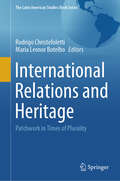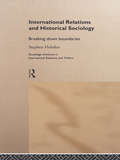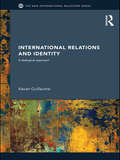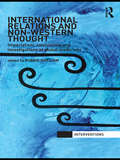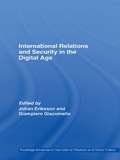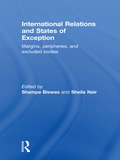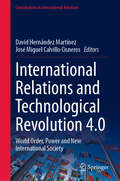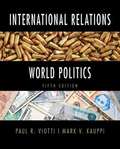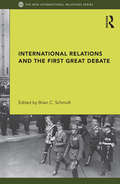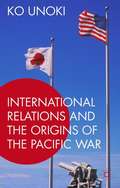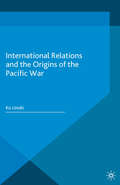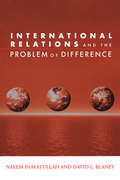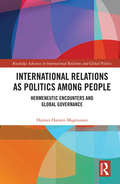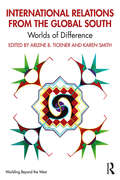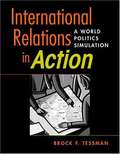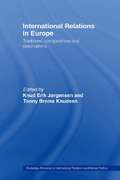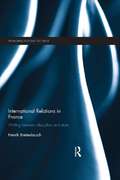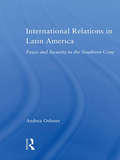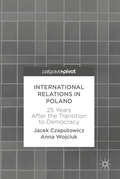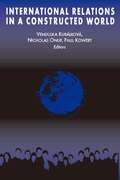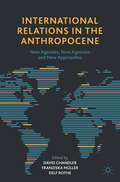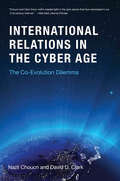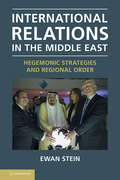- Table View
- List View
International Relations and Heritage: Patchwork in Times of Plurality (The Latin American Studies Book Series)
by Rodrigo Christofoletti Maria Leonor BotelhoPatchwork in times of plurality encompasses the multitude of actions as a revealing symbol of ethos, actors, organisms, and manifestations of preservation and dialogue frontiers. This plural metaphor, almost like a patchwork, aggregates and yet segregates, conforms, but disfigures, and boosts the meanings which represent this new field that international relations have been recently crossing. Just like the mirror metaphor - that reflects everything to all and, sometimes, intervenes in distortions - the patchwork analogy allowed the book to take responsibility for the disclosure of preservation actions on a global scale. The book has a pioneering role insofar since it is the only publication with such characteristics, concerns, and coverage. The work studies the interconnection between cultural properties and international relations by understanding them as a mosaic before the bridges that intertwine people and borders. The main goal of this work is to illustrate in what way intergovernmental relations have been privileging heritage and culture as acting fields for its broader needs. Therefore, the book addresses topics related to the international agenda, focusing on its less debated themes. Two examples of these undervalued matters are the link between actors, preservationist actions, and the universe of world cultural heritage. The book also pursuits a critical dialogue between interdisciplinary fields that narrow heritage frontiers in search to contribute with a spectrum of academic perspectives and (inter)national study cases. To serve distinct economic, social, or political purposes, institutionalized heritage (embodied by different values) becomes instrumentalized in a top-down direction. In a development frame, when we perceive culture as indispensable to human life, the past is transformed into exchange currency. Through the creation of alternative fields of action, usually in a bottom-up logic, the present builds new heritage connections. Digital heritage's preservation, dissemination, and appreciation have been representing these same nets.
International Relations and Historical Sociology: Breaking Down Boundaries (Routledge Advances in International Relations and Global Politics)
by Stephen HobdenThis book provides an original analysis of recent work by key historical sociologists through the prism of International Relations. Stephen Hobden investigates the number of issues which overlap between the two disciplines by focusing on three main themes: * the ways in which historical sociologists approach international relations in general and the concept of an international system in particular * recent advances on the concept of the state as developed by Historical Sociology and their implications for International Relations * the potential for productive dialogue between the two schools of thought.
International Relations and Identity: A Dialogical Approach (New International Relations)
by Xavier GuillaumeInternational Relations and Identity examines the issue of collective political identity formation and expands the concept of the international beyond the notion of states. Providing a dialogical approach to questions of identity and alterity in International Relations, the author considers how identity is formed, maintained and transformed in continuous processes with alterity. This innovative book seeks to broaden understanding of identity and difference by developing a process-based perspective. It shifts the attention from a dichotomising view of the international to the multiple ways by which identity and difference are related. It challenges traditional conceptions of the international and argues that it is constituted by the processes in which states and other actors participate and is more than a spatial dimension constituted by states. Guillaume illustrates this complex theory with a detailed case study of how Japanese political community has formed, performed and transformed in the nineteenth and early twentieth centuries, in light of the questions of empire and multiculturalism. International Relations and Identity will be of interest to students and scholars of international politics, international relations theory and Japanese studies.
International Relations and Non-Western Thought: Imperialism, Colonialism and Investigations of Global Modernity (Interventions)
by Robbie ShilliamInternational Relations, as a discipline, tends to focus upon European and Western canons of modern social and political thought. Alternatively, this book explores the global imperial and colonial context within which knowledge of modernity has been developed. The chapters sketch out the historical depth and contemporary significance of non-Western thought on modernity, as well as the rich diversity of its individuals, groups, movements and traditions. The contributors theoretically and substantively engage with non-Western thought in ways that refuse to render it exotic to, superfluous to or derivative of the orthodox Western canon of social and political thought. Taken as a whole, the book provides deep insights into the contested nature of a global modernity shaped so fundamentally by Western colonialism and imperialism. Now, as ever, these insights are desperately needed for a discipline that is so closely implicated in Western foreign policy making and yet retains such a myopic horizon of inquiry. This work provides a significant contribution to the field and will be of great interest to all scholars of politics, political theory and international relations theory.
International Relations and Security in the Digital Age (Routledge Advances in International Relations and Global Politics #Vol. 52)
by Johan Eriksson Giampiero GiacomelloThis book examines the impact of the information revolution on international and domestic security, attempting to remedy both the lack of theoretically informed analysis of information security and the US-centric tendency in the existing literature. International Relations and Security in the Digital Age covers a range of topics, including: critical infrastructure protection, privacy issues, international cooperation, cyber terrorism, and security policy. It aims to analyze the impact of the information revolution on international and domestic security; examine what existing international relations theories can say about this challenge; and discuss how international relations theory can be developed to better meet this challenge. The analysis suggests that Liberalism’s focus on pluralism, interdependence and globalization, Constructivism’s emphasis on language, symbols and images (including ‘virtuality’), and some elements of Realist strategic studies (on the specific topic of information warfare) contribute to a better understanding of digital age security. This book will be of interest to students of security studies, globalization, international relations, and politics and technology.
International Relations and States of Exception: Margins, Peripheries, and Excluded Bodies
by Shampa BiswasCritically but sympathetically interrogating Italian philosopher Giorgio Agamben’s analysis of the logic of sovereign power, this volume draws attention to the multiple zones of exclusion in and through which contemporary international politics constitutes itself. Beginning from the margins and peripheries of world politics, this book emphasises the colonial processes through which contemporary "third world" spaces of exception have been shaped and particular bodies made susceptible to the conditions of "bare life". The authors contend that these bodies inhabit a variety of spaces or "zones of indistinction" that include political detainees, refugees, asylum-seekers, poor migrants, sweatshop workers, and unassimilated indigenous populations. These are the "expendable bodies" that the territorial and market-driven logic of current international relations simultaneously produces, polices and excludes. Focussing on the locally and socio-historically specific ways that sovereign power works, the individual chapters provide the volume with a wide geographical reach. Drawing on diverse approaches, this text constitutes an important intervention in critical international relations, providing grounded theory and sophisticated analyses of how contemporary international relations works through the production of ‘exceptions’. Bringing together a range of internationally-renowned scholars, International Relations and States of Exception will be of vital interest to students and scholars of International Relations, Critical Theory and Postcolonial Studies.
International Relations and Technological Revolution 4.0: World Order, Power and New International Society (Contributions to International Relations)
by David Hernández Martínez José Miguel Calvillo CisnerosThis book analyzes the global implications of the fourth industrial revolution, the Technological Revolution 4.0, on International Relations. Examining the intersection of new technologies and international power, this volume engages in extensive discussions and debates surrounding the immediate and long-term consequences of innovations, such as artificial intelligence, big data, virtual reality, smart cities, and drones. The rapid and potent march of technological progress intensifies global curiosity and concern, particularly regarding control over these new technologies. The book discusses essential questions, such as the theoretical analysis of new technologies in international relations, their impact on the 21st-century world order, and the pivotal roles of international actors in this revolution. Finally, it examines how these new technologies are reshaping international security, cooperation, and communication. A critical resource for researchers and the general public, this book provides a contemporary and theoretical framework to contextualize the international discipline in light of the challenge posed by new technologies, while also discussing the key variables that mold international society in the 21st century within the parameters of this technological revolution. Moreover, it anticipates the prominent dynamics and challenges that will shape global structures, regions, and nations in the forthcoming decades.
International Relations and World Politics
by Paul R. Viotti Mark V. KauppiUpdated in its 5th edition, International Relations and World Politics is a toolkit that offers an authoritative survey of the field and practical ways to analyze current and future world problems. Drawn from the authors’ experience as scholars and practitioners, this new edition was completely rewritten to focus on an enduring teaching and learning goal–how individuals can apply theory, history, geography, and more for a lifetime of understanding politics in a globalized world. Whether as actors themselves in world politics, participants in the global economy, or simply readers of world news, those reading International Relations and World Politics not only get more help to master the field’s concepts but also get more help to understand that these are real-world ideas with real-world implications.
International Relations and the First Great Debate (New International Relations)
by Brian C. SchmidtThis book provides an authoritative account of the controversy about the first great debate in the field of International Relations. Of all the self-images of International Relations, none is as pervasive and enduring as the notion that a great debate pitting idealists against realists took place in the 1940s. The story of the first great debate continues to structure the contemporary identity of International Relations, yet in recent years revisionist historians have challenged the conventional wisdom that the field experienced such a debate. Drawing on expert contributors working in Canada, Europe, the United Kingdom, and the United States, this book includes key participants in the historiographical controversy. The book assembles the existing scholarship and provides a thorough analysis of the status of the first great debate in the history of International Relations. It is an invaluable examination of the causes and future direction of idealist and realist arguments. International Relations and the First Great Debate will be of interest to students and scholars concerned with the foundations of International Relations.
International Relations and the Origins of the Pacific War
by Ko UnokiInternational Relations and the Origins of the Pacific War takes the unique approach of examining the history of the relationship between Japan and the United States by using the framework of international relations theories to search for the origins of the Pacific War, that erupted with Japan's attack on Pearl Harbour in 1941.
International Relations and the Origins of the Pacific War
by Ko UnokiInternational Relations and the Origins of the Pacific War takes the unique approach of examining the history of the relationship between Japan and the United States by using the framework of international relations theories to search for the origins of the Pacific War, that erupted with Japan's attack on Pearl Harbour in 1941.
International Relations and the Problem of Difference
by Naeem Inayatullah David L. BlaneyInternational Relations and the Problem of Difference has developed out of the sense that IR as a discipline does not assess the quality of cultural interactions that shape, and are shaped by, the changing structures and processes of the international system. In this work, the authors re-imagine IR as a uniquely placed site for the study of differences as organized explicitly around the exploration of the relation of wholes and parts and sameness and difference-and always the one in relation to the other.
International Relations as Politics among People: Hermeneutic Encounters and Global Governance (Routledge Advances in International Relations and Global Politics)
by Hannes Hansen-MagnussonPioneering a hermeneutic methodology for analyses of global governance, this is the first monograph that makes Hans-Georg Gadamer’s and Paul Ricœur’s hermeneutic philosophy relevant for global politics research. Drawing on the concept of "horizon" as the element that captures the dynamics of understanding in social interaction in order to analyse processes of international politics, this book shows that what is required is the embeddedness of meanings and ideas in human action and reflection. By advancing theory-building with regard to particular questions of global governance, it reconceptualises international relations as "politics among people". Providing a contextualised constructivist approach that highlights the importance of processes to which people are central, it challenges the use of collective concepts such as "state" and "nation" as units of analysis which continue to dominate international relations but which cloud the details of interaction processes. The two case studies of UN Convention on the Law of the Sea and Germany in NATO’s mission "Operation Allied Force" in Kosovo in 1999 are structured around this contextualised constructivist approach developed in the monograph. The studies reveal how interaction processes can be made accountable, leading to new vantage points of our understanding of governance problems. This book will be of interest to scholars interested in global governance, the work of Hans-Georg Gadamer, Paul Ricœeur and hermeneutic philosophy, the UN, humanitarian interventions, and foreign policy analysts.
International Relations from the Global South: Worlds of Difference (Worlding Beyond the West)
by Arlene B. TicknerThis exciting new textbook challenges the implicit notions inherent in most existing International Relations (IR) scholarship and instead presents the subject as seen from different vantage points in the global South. Divided into four sections, (1) the IR discipline, (2) key concepts and categories, (3) global issues and (4) IR futures, it examines the ways in which world politics have been addressed by traditional core approaches and explores the limitations of these treatments for understanding both Southern and Northern experiences of the "international." The book encourages readers to consider how key ideas have been developed in the discipline, and through systematic interventions by contributors from around the globe, aims at both transforming and enriching the dominant terms of scholarly debate. This empowering, critical and reflexive tool for thinking about the diversity of experiences of international relations and for placing them front and center in the classroom will help professors and students in both the global North and the global South envision the world differently. In addition to general, introductory IR courses at both the undergraduate and graduate levels it will appeal to courses on sociology and historiography of knowledge, globalization, neoliberalism, security, the state, imperialism and international political economy.
International Relations in Action: A World Politics Simulation
by Brock TessmanThis hands-on exercise allows students to relate the concepts and issues at the foundation of global politics to the realities of international politics today. As influential leaders in the fictional world of Politica, each team of students governs a country with a unique history, geography, and culture. The teams must use strategy and negotiation to succeed - and survive - seeking to achieve specific territorial, security, and economic objectives. In the process, they grapple with a range of complex challenges: energy security, ethnic conflict, humanitarian intervention, environmental disaster, terrorism, nuclear proliferation, and more. Students also pursue individual objectives based on the governmental post they hold - and quickly learn that self-interest and national interest are not always compatible. Teams are judged on their effectiveness in meeting stated objectives, but must also relate their practical experience to the academic content of the course. Toward this end, the book provides summaries, analysis, study questions, and additional sources of information for each of the theories and issues encountered during the simulation. Guidelines for instructors are also included. "International Relations in Action" has been tested in multiple courses, with students and instructors unanimously agreeing that it makes abstract theories practical and accessible, evokes an appreciation for the complexity of international politics, and generates enthusiasm for the study of international relations. In the representative words of one student, "It was the best learning experience I've ever had."
International Relations in Europe: Traditions, Perspectives and Destinations (Routledge Advances in International Relations and Global Politics #Vol. 44)
by Knud Erik Jørgensen Tonny Brems KnudsenA new and illuminating critical examination of international relations in Europe. This new volume presents all of the state of the art thinking, focusing particularly on international relations theory and theoretical debates in Western and Central European countries.The contributors seek to strengthen knowledge about different ways of cultivating the discipline; to intensify pan-European communication concerning IR theory; to contribute to improving the quality of theorizing; and finally to consider future directions for the discipline in Europe. The main issues addressed include: the historical development of the discipline; factors driving IR theorizing; the institutional and cultural context of theorizing; 'homegrown' theory-building vs. theory import; patterns of traditional and new discourse; and the diversity of disciplinary traditions.
International Relations in France: Writing between Discipline and State (Worlding Beyond the West)
by Henrik BreitenbauchWhy is the French International Relations (IR) discipline different from the transnational-American discipline? By analysing argument structures in research articles across time, this book shows how the discipline in France is caught between the American character of the discipline and the French state as regulator of legitimate forms of expression. Concretely, French research arguments are less explicit about what their propositions are and what academic discussions they draw on and add to than their transnational-American counterparts. Based on a comparative case study of French and American IR research from 1950 to 2011, the book is a major contribution to the meta-IR literature on global, regional and national traditions of IR. The challenge to the French discipline of whether and how to position itself in relation to the evolving American discipline is in many ways exemplary for other non-American national IR disciplines, and the choices as well as the structural conditions underlying the French case are relevant to all non-Western disciplines. The comparative analysis moreover reveals that the modern American discipline -- what is considered as recognisable social science -- takes shape only during the 1970s. The book thus offers new knowledge about the discipline's international development as such. Both case and methodology are interesting to larger audiences outside IR, in the history and sociology of social science, contrastive rhetoric, as well as French and cultural studies.
International Relations in India
by Kanti P. Bajpai Siddharth MallavarapuThis reader is a collection of first-rate theoretical engagements relating to International Relations from across India.
International Relations in Latin America: Peace and Security in the Southern Cone
by Andrea OelsnerThis work studies the development of bilateral relations in two pairs of states (dyads): Argentina-Brazil and Argentina-Chile. It takes on a moderate constructivist approach that incorporates into the analysis of international relations the role of identities, ideas and perceptions as well as of material forces, and understands that the former are affected and changed during interaction. It also uses to securitization theory to explain how issues come or cease to be considered security matters through social constructions.
International Relations in Poland
by Jacek Czaputowicz Anna WojciukThis book critically examines the study of International Relations in Poland, looking at the pre-academic origins of the discipline, its development after WWII, under communism, and after the transformation of 1989. Apart from bringing a broad political and intellectual context, it offers a thorough quantitative and qualitative study of hundreds of books and scientific articles. The theoretical and methodological practices of Polish IR scholars are presented in a comparative perspective, looking for common patterns with other European countries. This book is an invaluable resource for scholars with an interest in sociology of IR, disciplinary history or scholarly metrics.
International Relations in Political Thought: Texts from the Ancient Greeks to the First World War
by Terry Nardin Chris Brown Nicholas RenggerThis unique collection presents texts in international relations from Ancient Greece to the First World War. Major writers such as Thucydides, Augustine, Aquinas, Machiavelli, Grotius, Kant and John Stuart Mill are represented by extracts of their key works; less well-known international theorists including John of Paris, Cornelius van Bynkershoek and Friedrich List are also included. Fifty writers are anthologised in what is the largest such collection currently available. The texts, most of which are substantial extracts, are organised into broadly chronological sections, each of which is headed by an introduction that places the work in its historical and philosophical context. Ideal for both students and scholars, the volume also includes biographies and guides to further reading.
International Relations in a Constructed World
by Vendulka KubalkovaExplores the application of constructivist theory to international relations. The text examines the relevance of constructivism for empirical research, focusing on some of the key issues of contemporary international politics: ethnic and national identity; gender; and political economy.
International Relations in the Anthropocene: New Agendas, New Agencies and New Approaches
by David Chandler Delf Rothe Franziska MüllerThis textbook introduces advanced students of International Relations (and beyond) to the ways in which the advent of, and reflections on, the Anthropocene impact on the study of global politics and the disciplinary foundations of IR. The book contains 24 chapters, authored by senior academics as well as early career scholars, and is divided into four parts, detailing, respectively, why the Anthropocene is of importance to IR, challenges to traditional approaches to security, the question of governance and agency in the Anthropocene, and new methods and approaches, going beyond the human/nature divide.
International Relations in the Cyber Age: The Co-Evolution Dilemma (The\mit Press Ser.)
by David D. Clark Nazli ChoucriA foundational analysis of the co-evolution of the internet and international relations, examining resultant challenges for individuals, organizations, firms, and states.In our increasingly digital world, data flows define the international landscape as much as the flow of materials and people. How is cyberspace shaping international relations, and how are international relations shaping cyberspace? In this book, Nazli Choucri and David D. Clark offer a foundational analysis of the co-evolution of cyberspace (with the internet as its core) and international relations, examining resultant challenges for individuals, organizations, and states.The authors examine the pervasiveness of power and politics in the digital realm, finding that the internet is evolving much faster than the tools for regulating it. This creates a “co-evolution dilemma”—a new reality in which digital interactions have enabled weaker actors to influence or threaten stronger actors, including the traditional state powers. Choucri and Clark develop a new method for addressing control in the internet age, “control point analysis,” and apply it to a variety of situations, including major actors in the international and digital realms: the United States, China, and Google. In doing so they lay the groundwork for a new international relations theory that reflects the reality in which we live—one in which the international and digital realms are inextricably linked and evolving together.
International Relations in the Middle East: Hegemonic Strategies and Regional Order
by Ewan SteinDeveloping an original theoretical approach to understanding the roots of regional conflict and cooperation, International Relations in the Middle East explores domestic and international foreign policy dynamics for an accessible insight into how and why Middle Eastern regional order has changed over time. Highlighting interactions between foreign policy trajectories in a range of states including Egypt, Iran, Iraq, Israel, Saudi Arabia, Syria and Turkey, Ewan Stein identifies two main drivers of foreign policy and alignments: competitive support-seeking and ideological externalisation. Clearly linking political, ideological and foreign policy dynamics, Stein demonstrates how the sources of regional antagonisms and solidarities are to be found not in the geopolitical chessboard, but in the hegemonic strategies of the region's pivotal powers. Making the case for historical sociology - in particular the work of Antonio Gramsci and Louis Althusser - as the most powerful lens through which to understand regional politics in the Middle East, with wider implications for the study of regional order elsewhere.
